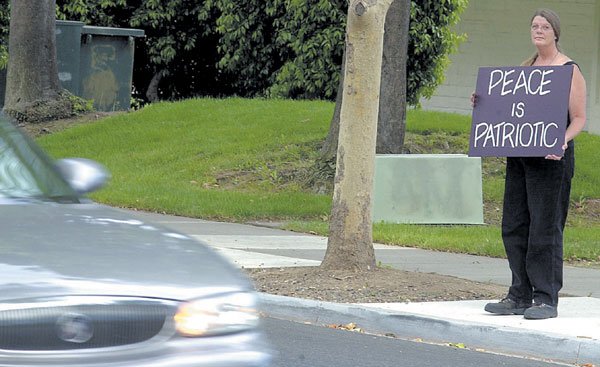GILROY
– Friday, a small group of local women will dress in black, hold
candles and signs and demonstrate for one hour outside the Gilroy
Public Library on Sixth Street.
GILROY – Friday, a small group of local women will dress in black, hold candles and signs and demonstrate for one hour outside the Gilroy Public Library on Sixth Street.
Standing still in front of the street’s lofty red-, yellow- and orange-leafed trees, the dark-clad women will have absolutely nothing to say.
That’s not because the Women in Black don’t have opinions. Rather, silence is the group’s way of showing its predominant one – violence begets violence.
“Some of us pray, others just stand. I like to imagine that my silent presence is planting seeds of thought in the people who drive by,” explained Isa Dempsey, a retired Gavilan College professor who now resides in Watsonville.
Dempsey and as many as a dozen other area women have been planting those seeds since March 8, when Gilroy resident Leah Halper organized a group of three women to demonstrate in recognition of International Women’s Day. Holding signs that read such things as “God Bless America with peace,” “It is the time for peace” and “Peace is patriotic,” the local Women in Black have been meeting every Friday from 4:30 to 5:30 p.m. ever since.
“Violence is easy,” says Kathy Baameur, a Morgan Hill resident and Gavilan College faculty member. “I’d say the idea that you can use violence to stop violence is obsolete, and we can see that every day in the Middle East,” Baameur replies in response to a reporter’s question about whether pre-emptive force is necessary to defend against terrorism.
Halper declined to comment for this story.
As the potential for war in Iraq looms overhead, the group doesn’t see itself taking a Friday off any time soon, not even during a downpour of rain like the one that hit Gilroy last week.
“We’re experimenting with spraying our signs with lacquer,” said Dempsey, “but the rain isn’t going to stop us.”
Fresh off the demonstration line, the women gather in a circle to share thoughts and feelings as well as discuss less ephemeral topics like whether someone might be absent the next week.
“It’s just a regroup,” Baameur explains.
The women say they are not concerned about people who might be turned off by their pacifist message and categorize their opinions as that of a cult. In fact, Women in Black doesn’t even want to be known as an organization.
“We’re a movement,” asserts Dempsey, echoing a line from the WIB mission statement.
The self-described “international peace network” first mobilized in 1988 when Israeli and Palestinian women gathered to protest Israel’s occupation of the West Bank and Gaza. It has since spread all over the world and after Sept. 11 saw an increase in the United States, the group says.
The Gilroy group saw its share of growth, too. When the number of protesters reached about a dozen a few months ago, WIB Gilroy broke off into a Hollister sister group. The Hollister group meets between 4:30 and 5:30 p.m. at Main and Fourth streets in Hollister.
The Gilroy group plans to continue holding its meetings on Sixth Street, a thoroughfare for local traffic and a focal point for the community since the library and City Hall is nearby.
Their values may be similar and the color of their clothes identical, but local Women in Black members differ vastly in their backgrounds. There are the college professors like Dempsey and Baameur. There are widows, divorcees, married women, white and blue collar professionals, Gilroy residents and non-Gilroyans. Their ages range from the late 30s to early 70s. Once, the group was joined by a male protester.
“We welcome anyone who is interested in protesting against violence,” Dempsey said.
The group says it is thankful for the way the majority of the public has received it.
“It’s always nice to hear the horns honking,” admits Gilroy resident Alice Souza, a newer member of Women In Black.
Usually the horns honk in support, but some passers-by have let their opposing opinions be known, too. The group recalled one lady who got out of her car livid, scolding them for “giving a wrong message” and being unpatriotic. The woman told the group they should spend their time writing to Saddam Hussein to ask for peace.
The local Women in Black don’t believe a dictator like Hussein would consider their plea, but they assert that it’s not unpatriotic to want peace. On Oct. 26, Dempsey and Baameur put that belief on display when they joined tens of thousands of people in San Francisco to protest war against Iraq.
Besides an occasional protest with larger groups, the local Women in Black do not have any further political aspirations. The women said they had no plans, for instance, to affect change in Gilroy city Santa Clara County government.
“Other than a change of consciousness, we’re not pushing for any particular political change,” Souza said.
Other passers-by, who some of the women would have figured to be opposed to WIB efforts, have been supportive with their words. The women told the story of a World War II veteran who waited patiently until after the Women in Black finished that day’s vigil. He told them he supported a push for peace and that the buddies he lost in the war would be “turning in their graves” if they could see how the government handles its foreign affairs today.
To contact the local chapter of Women in Black, send an e-mail to: [email protected].














